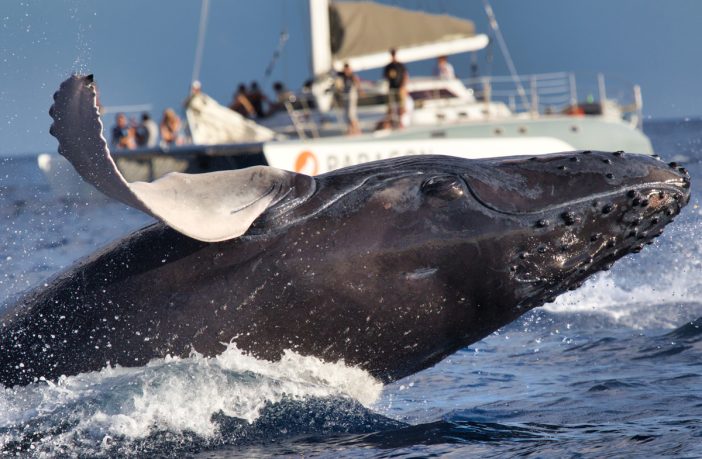New York State Department of Environmental Conservation (DEC) Commissioner Basil Seggos today reminded New Yorkers along coastal shores to always keep a safe distance from marine mammals and resist the urge to intervene when an animal comes ashore. Marine mammals, which include whales, dolphins, porpoises, and seals, are protected by federal and state laws to ensure they are not harmed and to keep people at a safe distance.
“New York’s marine waters provide vital nursery and foraging grounds for whales, dolphins, and seals that migrate across the Atlantic Coast,” Commissioner Seggos said. “Observing these animals in the wild can be an exciting and unforgettable experience. However, DEC urges New Yorkers to keep their distance and refrain from attempting to intervene during stranding events. Stranded animals will need professional medical care and the best way to help is to immediately contact the Stranding Hotline.”
The public can best help injured or distressed marine mammals by reporting sightings immediately to the New York Marine Mammal and Sea Turtle Stranding Hotline at (631) 369-9829 so that trained responders can properly assess and care for these animals.
Atlantic Marine Conservation Society Executive Director Rob DiGiovanni said, “Marine mammals and sea turtles have been observed in the New York Bight more frequently in recent years. Community members are instrumental in the work that we do, especially in reporting sick, injured or deceased animals. Our mission is to share the lessons learned from marine mammal and sea turtle stranding events and we are available to present safe wildlife viewing and response protocols for our community partners. It’s most important to remember to first call the Stranding Hotline so that trained responders can help assist animals when they’re in a stressed and vulnerable situation.”
New York Marine Rescue Center Program Director Maxine Montello said, “We truly understand that people have the best intentions when trying to help these charismatic marine animals. However, most of these animals are extremely compromised and an inexperienced person could cause more damage to the animal. We encourage people to help by immediately calling the New York Stranding Hotline to report all sightings or standings of marine mammals and sea turtles.”
Whales and Dolphins
New York’s marine waters are visited by many species of whales and dolphins. The federal Marine Mammal Protection Act (MMPA) administered by the National Ocean and Atmospheric Association (NOAA) requires people to maintain a safe and legal distance from marine mammals on water and land. Check NOAA’s Marine Life Viewing Guidelines for specific viewing distance laws and regulations for various marine mammal species. It is illegal to touch, feed, disturb, or harass marine mammal species, including whales and dolphins. A violation of the MMPA may result in up to one year of jail time and/or fines up to $20,000. If a distressed animal or carcass washes ashore, do not attempt to intervene or touch the animal. Instead, immediately call the 24-hour New York Marine Mammal and Sea Turtle Stranding Hotline at (631) 369-9829 to report the animal and its location.
While attempts by the public to push animals back toward the water may be well-intended, there are serious safety concerns for both the animals and the people who intervene. Entering the water with live distressed animals, and even large carcasses, is extremely hazardous. Unpredictable movement by the animal, the force of the ocean surf, and harsh weather conditions can lead to serious human injury or death. The physical effort of pushing, rolling, or dragging the animal by the tail puts additional strain on their bodies and can cause further injury or delay professional care. To provide the best assistance possible for the animal, contact the Stranding Hotline and a trained responder will guide callers through possible next steps. However, it’s important to remember that in the majority of cases, simply remaining at the site until help arrives is the only action you may take.
Seal Season is Coming
Harbor, grey, and harp seals are regularly seen on many of New York’s saltwater beaches and in bays during the winter. The height of the season in New York is typically March through May, but they can be observed as early as November and December in some areas of New York. Seals can commonly be seen hauled out (laying) on rocks and sandbars. This behavior is essential for seals to rest, socialize, and regulate body temperature. DEC reminds New Yorkers that most seals on land are not in distress and that interfering with their natural resting behavior can cause illness, injury, or even death for these animals. Please help keep seals safe by allowing them the space and time they require on the beach.
Remember that while they may appear friendly and adorable, seals are wild animals with sharp teeth, capable of biting and sharing disease, so always keep people and pets at least 50 yards away from seals. While viewing seals from this legally safe distance, if the seal’s behavior changes and/or they notice your presence, that is a sign to move further away. Signs of stress in seals include raising their flippers, showing their teeth, yawning, and eating sand and rocks.
Report Distressed Marine Life to the New York Stranding Hotline
If you see a marine mammal in distress or wash ashore, contact the 24-hour New York State Marine Mammal and Sea Turtle Stranding Hotline immediately at (631) 369-9829 and relay as much information about the animal and its location as possible. The hotline is monitored by the Atlantic Marine Conservation Society (AMSEAS) and New York Marine Rescue Center (NYMRC) which are federally permitted and trained to handle marine mammals and administer professional medical care. Response teams work collaboratively with DEC, NOAA Fisheries, and numerous other partners to develop and implement a response to successfully provide the most effective and efficient aid to the animal.
You can report general sightings of marine mammals to DEC’s Flipper Files digital survey to help DEC better understand marine mammal distribution in New York. For more information on whales, dolphins, and seals, visit DEC’s Marine Mammals of New York and Marine Protected Resources webpages.
If you observe an individual harassing or endangering New York’s marine life, contact DEC Environmental Conservation Police Officers (ECOs) to report the incident by calling 1-844-DEC-ECOS for 24-hour dispatch or emailing central.dispatch@dec.ny.gov (for non-urgent violations).













